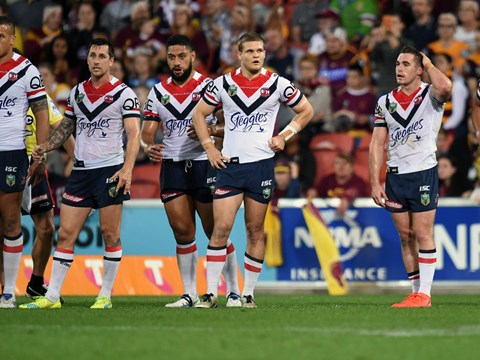
Back in 2014, just a couple of seasons ago, the Cronulla Sharks and Canberra Raiders finished last and second last on the NRL Telstra Premiership ladder.
By the end of 2016, the Sharks were premiers while the Raiders had finished second in the regular season with the best attacking record in the league.
Things can change quickly in the NRL, particularly the fortunes of struggling teams.
The massive turnarounds for Cronulla and Canberra weren't even out of the ordinary. While those teams were slumping to the bottom of the ladder in 2014, the Penrith Panthers were playing their way into the NRL top four – two seasons after running 15th.
In 2013 the Sydney Roosters were the major and minor premiers, a year after finishing well outside of the finals race in 13th.
In 2012, five of the eight teams in the finals had missed the playoffs two years previously. That includes minor premiers Canterbury, grand final winners Melbourne and future premiership winners North Queensland and Cronulla – the teams that had occupied the bottom four places in the league in 2010.
And in 2010, the Panthers and Warriors both jumped nine league places in a single season to finish inside the NRL's top five, while the Roosters jumped 10 spots in a season to finish sixth after taking out the wooden spoon in 2009.
The salary cap doesn't just level out the playing field by making it tough for the top teams to successfully defend a premiership – something that hasn't happened since the unified NRL competition began in 1998. The cap also makes it possible for struggling teams to climb up the ladder – and fast.
So, how do they do it? Let's look at recent success stories the Sharks and Raiders.
Both clubs have had some key youngsters come through the ranks in the past few seasons – in particular rep players Valentine Holmes (who debuted for the Sharks in 2014), Jack Bird (Sharks debutant in 2015) and Shannon Boyd (Canberra debutant in 2014).
But the recruiting drives of both clubs have been arguably more vital.
Both the Sharks and Raiders overhauled their playmaking spines in the past few seasons. None of the players who lined up at fullback, five-eighth, halfback and hooker for those clubs at the start of 2014 were still in those roles in 2016.
The Sharks' premiership-winning spine of Ben Barba, James Maloney, Chad Townsend and Michael Ennis were all recruited within the previous two seasons. The Raiders brought in Blake Austin, Josh Hodgson and Aidan Sezer in the last couple of years, after switching Jack Wighton to fullback in the final rounds of 2014.
Of course, they weren't the only signings – the Raiders in particular strengthened their starting side with the likes of back-rowers Sia Soliola and Elliott Whitehead and lethal edge duo Jordan Rapana and Joey Leilua.
The other notable factor for both those teams is that they blooded a lot of rookies in recent years – which meant they didn't have to bring in untested players in 2016. For the Sharks this was a necessity in 2014, when 10 of their players made their NRL debuts after the peptides scandal hit the club. It's meant they've only had to give debuts to a couple of players since then – Bird in 2015 and Luke Capewell last year.
Last season's results suggest teams who don't use many debutants tend to win more games. In 2016, six clubs had no more than two players make their NRL debut – and four of those clubs finished in the NRL top four (the other two were Parramatta, who missed the finals after being stripped of competition points due to salary cap breaches, and Manly, who brought in a massive 13 recruits last season).
By contrast, the three clubs with the most debutants last year – the Roosters, Knights and Rabbitohs – finished in the bottom four for the league in terms of wins. This isn't a surprise (losing teams are more likely to drop players and look to the future) but on the positive side it could set them up for success in the future if the Sharks' rapid rise since 2014 is any guide.
The Rabbitohs and Roosters in particular could bounce back quickly considering the Rabbitohs had appeared in the past four finals series before 2016 and the Roosters were coming off three straight minor premierships. Both clubs boast several current rep players, while the Sea Eagles, who finished 13th in 2016, also have a few rep stars in their ranks and have already begun an overhaul of their roster under Trent Barrett.
Will all the teams that struggled last year be finals contenders this season? Probably not. But don't be surprised if at least a few of them aren't back in the premiership race in a couple of years' time.